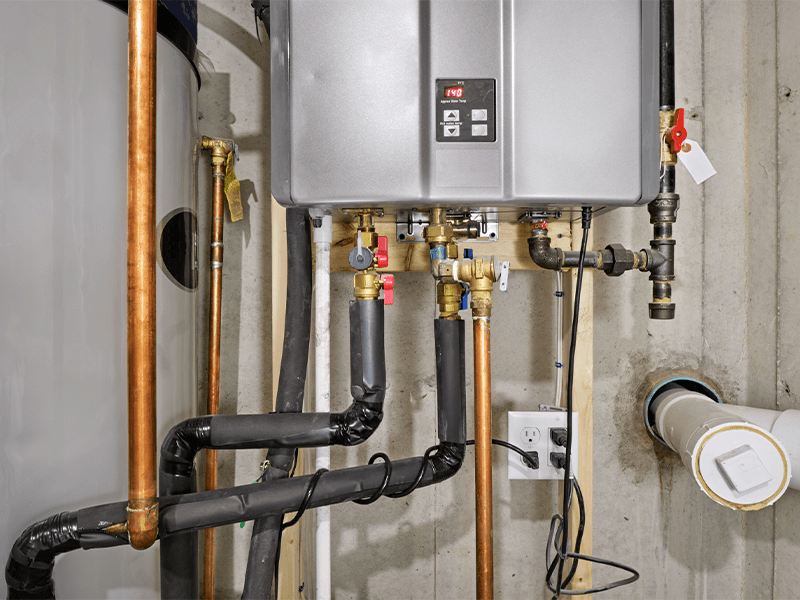Is your water heater experiencing frequent repairs? Extending the life of your water heater can help you avoid unexpected costs and ensure a steady supply of hot water. By following the practices laid out in this guide, homeowners can improve their water heater efficiency and prevent common issues. This knowledge will not only teach you how to properly care for your water heater, but it will also enhance its performance, prevent constant breakdowns, and help you save money.
Understanding How Your Water Heater Works
A water heater typically consists of a storage tank, a heating element, and a thermostat. The tank holds cold water until it is heated for use in the home.
The heating element warms the water inside the tank, while the thermostat regulates the temperature to ensure a consistent hot water supply. The proper functioning of these components is essential for efficient operation.
Maintaining the correct pressure and temperature levels prevents unnecessary strain on the water heater. Fluctuations can lead to increased wear and reduce the appliance’s lifespan.
Understanding usage patterns helps in managing the water heater effectively. Overuse or excessive demand can accelerate wear, making it important to adjust hot water usage to extend the heater’s life.
Key Maintenance Steps to Extend Water Heater Life
Regularly draining the water heater tank removes sediment buildup, which can impede heating efficiency and reduce the appliance’s lifespan. Flushing the tank at least once a year helps maintain optimal performance and prevents overheating.
Another step is to inspect the anode rod periodically as this prevents corrosion inside the tank. Replacing a worn or damaged anode rod can significantly increase the water heater’s durability. This proactive measure safeguards the heater from internal rust and extends its operational years.
Monitoring and adjusting the thermostat settings also ensures that the water heater operates within the recommended temperature range. Keeping the temperature at an optimal level reduces energy consumption and minimizes wear on the heating components.
Meanwhile, ensuring proper insulation of the water heater and its pipes minimizes heat loss and enhances energy efficiency. Using insulating blankets or pipe covers helps retain heat and reduces the workload on the heater. Effective insulation contributes to a longer-lasting water heater and lower energy bills.
Flushing the Tank
Flushing the tank is a key maintenance task that removes sediment accumulation in the water heater. Over time, minerals and debris can settle at the bottom, reducing efficiency and increasing wear. Regular flushing ensures the heater operates smoothly.
To flush the tank, first turn off the water heater and allow it to cool. Attach a hose to the drain valve and direct it to a safe drainage area. Open the valve and let the water flow out completely, removing the sediment buildup.
It is recommended to flush the tank at least once a year. Depending on water hardness and usage, more frequent flushing may be necessary. Maintaining a regular schedule helps keep the water heater functioning effectively.
By removing sediment, flushing the tank enhances the heater’s efficiency and prevents overheating. This maintenance step contributes to a longer lifespan and reduces the likelihood of costly repairs.
Checking and Replacing the Anode Rod
Inspecting the anode rod is essential for preventing corrosion inside the water heater tank. This component attracts corrosive elements, protecting the tank from rust and deterioration. Regular checks can identify wear and determine when replacement is necessary, ensuring the heater remains efficient.
To check the anode rod, first turn off the water heater and disconnect the power or gas source. Using a wrench, carefully remove the rod from the tank and examine its condition. If significant corrosion or depletion is evident, replacing the anode rod can extend the water heater’s lifespan.
Replacing a worn anode rod involves selecting the appropriate material—such as magnesium or aluminum—suited for the water quality. Installing a new rod helps maintain the tank’s integrity by continuing to mitigate corrosion.
Homeowners should schedule an annual inspection of the anode rod to monitor its effectiveness. Addressing issues promptly prevents internal damage and avoids costly repairs or premature replacement of the water heater. Consistent maintenance also ensures reliable operation and extends the appliance’s service life.
Proper Insulation
Proper insulation of the water heater significantly reduces heat loss, ensuring that the appliance operates efficiently. Insulating blankets or foam covers can be applied to the tank to maintain the desired temperature with less energy.
Additionally, insulating the water heater’s pipes minimizes heat dissipation as hot water travels through the plumbing system. Pipe insulation helps maintain water temperature, reducing the workload on the heater and preventing unnecessary energy consumption.
Using high-quality insulation materials enhances the overall energy efficiency of the water heater. Effective insulation not only lowers utility bills but also decreases the frequency of heating cycles, thereby extending the appliance’s lifespan.
Regularly checking the insulation for wear and replacing it when necessary ensures continuous performance. Maintaining proper insulation is a simple yet vital step in prolonging the life of a water heater and promoting sustainable energy use.
Regular Inspection for Leaks
Regular inspections for leaks are important in maintaining a water heater’s efficiency and preventing extensive damage. Detecting small leaks early can stop minor issues from escalating into costly repairs or replacements. Homeowners should schedule routine checks to ensure all connections and components remain secure.
During leak inspections, attention should be given to visible pipes, valves, and the tank itself. Even minor drips can indicate underlying problems that need immediate attention. Addressing these signs promptly helps preserve the water heater’s integrity and prolongs its operational lifespan.
Properly sealed connections and well-maintained components play a crucial role in preventing leaks. Using high-quality materials and ensuring tight fittings can minimize the risk of water escaping from the system. Consistent maintenance practices support the overall durability of the water heater.
Monitoring for leaks also contributes to energy efficiency by maintaining optimal water levels and reducing unnecessary pressure on the heater. An efficiently running water heater not only saves energy but also reduces the likelihood of premature wear and tear. This proactive approach ensures reliable performance for years to come.
Scheduling Professional Tune-Ups
Scheduling professional tune-ups is essential for maintaining a water heater’s efficiency. Experts can detect and address issues that may not be visible during routine checks.
During a tune-up, technicians inspect critical components such as heating elements and thermostats. This thorough examination ensures that the water heater operates smoothly and reliably.
It is advisable to have a professional tune-up once a year to prevent unexpected breakdowns. Regular maintenance can significantly extend the lifespan of the water heater.
Professional inspections also enhance energy efficiency by optimizing the water heater’s settings. Efficient operation reduces energy consumption and lowers utility bills over time.
Additional Tips and Best Practices
Regulating the home’s water pressure is an effective practice that can extend the life of a water heater. Excessive pressure can cause undue stress on the appliance, leading to premature wear. Installing a pressure regulator helps maintain optimal levels, enhancing the heater’s longevity.
Incorporating a water softener can also minimize mineral buildup within the tank. Hard water accelerates the accumulation of scale, which impairs heating efficiency. By using a softener, homeowners reduce sediment formation and preserve the heater’s functionality.
Another tip is to limit hot water usage as this can lessen the heater’s workload. Simple actions, such as taking shorter showers or using energy-efficient fixtures, contribute to decreased demand. Lower usage rates translate to less strain and extended appliance life.
Besides, ensuring proper ventilation around the water heater prevents overheating. Adequate airflow allows the unit to operate efficiently without excessive heat buildup. Maintaining clear vents, therefore, supports optimal performance and durability.
Warning Signs You Need a Replacement
One major indicator that a water heater needs replacement is inconsistent water temperatures. If the water suddenly becomes too hot or not hot enough, it suggests that the thermostat or heating elements are failing.
Another sign is the presence of frequent leaks around the water heater. Leaks can result from corrosion, faulty valves, or deteriorating seals. Persistent water leakage not only reduces the appliance’s effectiveness but can also cause significant property damage if not addressed promptly.
Aging units often exhibit strange noises, such as popping or cracking sounds. These noises typically arise from sediment buildup at the bottom of the tank, which disrupts the heating process. When flushing the tank no longer mitigates these sounds, it may be time to consider a replacement.
Reduced hot water supply despite regular maintenance efforts also indicates that the water heater is nearing the end of its lifespan. If the heater struggles to meet the household’s hot water demands, it becomes less reliable and efficient. Recognizing this decline early can help ensure continuous access to hot water and avoid unexpected outages.
Keep Your Water Heater at Its Best!
At Precise Plumbing & Drain, we pride ourselves on delivering exceptional plumbing solutions tailored to your needs—keeping your water heater running at its best for years to come. Our skilled technicians are ready to assist with inspections, repairs, or installations to ensure you always have dependable hot water. Contact us today to schedule a service appointment and experience the Precise Plumbing & Drain difference!



